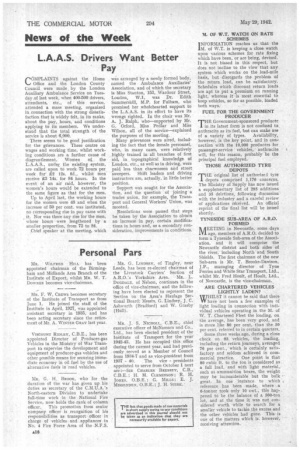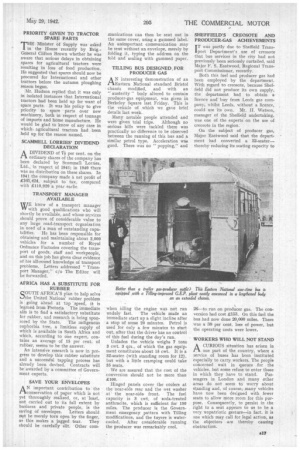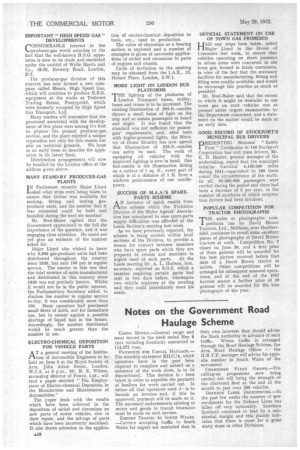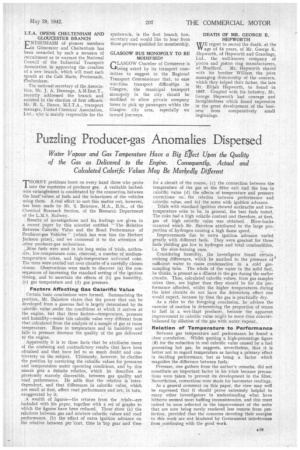News of the Week
Page 18

Page 19

Page 20

Page 21

If you've noticed an error in this article please click here to report it so we can fix it.
L.A.A.S. Drivers Want Better
Pay
rONIPLAINTS against the Home
Office and the London County Council were made , by the London Auxiliary Ambulance Service on Tuesday of last week, when 400-500 drivers. attendants, etc., of this service, attended a mass meeting, organized in connection with the strong dissatisfaction that is widely felt, in its ranks, about the pay, hours, and conditions applying to its members. We understand that the total strength of the service is about 6,000.
There seems to be good justification for the grievances. These centre on wages and working time, whilst working conditions are a further cause of disgruntlement. Women ot the L.A.A.S., under the existing system, are called upon to work 72 hours per week for' £.2 12s. 6d., whilst men. receive £3 14s. for 84 hours. In the event of an air raid, however, the women's hours would be extended to the same figure as that for the men.
Up to April last, the working hours for the women were 48 and when the increase of 50 per cent, was instituted, no corresponding rise in pay came with it. Nor was there any rise for the men, whose hours were lengthened by a smaller proportion, from 72 to 84.
Chief speaker at the meeting, which was arranged by a newly formed body, named the Ambulance Auxiliaries' Association, and of which the secretary is Miss Stanton, 153, Wardour Street. London, W.1, was Dr. Edith Summerskill, M.P. for Fulham, who promised her wholehearted support to the L.A.A.S. in its effort to have its wrongs righted. In the chair was Mr. A. J. Ralph, who—supported by Mr. G. Orford, Miss Pedlar and Miss Wilson, all of the service—explained the purposes of the meeting.
Many grievances were aired, including the fact that the female personnel, who, in many cases, were relatively highly trained in all branches of first aid, in topographical knowledge of London, etc., as well as in driving, were paid less than charwomen and street sweepers. Shift leaders and driving instructors are, actually, in little better position.
Support wa's sought for the Association, and the question of joining a trades union, for example, the Transport and General Workers Union, was mooted.
Resolutions were passed that steps be taken by the Association to obtain an increase in pay, certain modifications in hours and, as a secondary consideration, improvements in conditions. M. OF W.T. WATCH ON RATE SCHEMES
INFORMATION reaches us that the M. of W.T. is keeping a close watch upon various schemes for rate fixing which have been, or are being, devised. It is not biased in this respect, but does not incline to the view that any system which works on the lead-mile basis, but disregards the problem of the return load, can be satisfactory. Schedules which discount return loads are apt to put a .premium on running light, whereas it is most essential to keep vehicles, so far as possible, loaded both ways.
FUEL FOR THE GOVERNMENT PRODUCER
THE Government-sponsored producer in its latest form is not confined to anthracite as its fuel, but can snake use of a variety of types. Availability, however, is the key point, and in con, nection with the 10,000 producers for passenger-service vehicles, anthracite will, for this reason, probably be the principal fuel employed.
THOSE AUTHORIZED TYRE DEPOTS
THE original list of authorized tyre depots comprised 1,176 concerns. The Ministry of Supply has now issued a supplementary list of 295 additions and 35 deletions, following discussion with the industry and a careful review
of applications re'ceived. An official reprint of the final list will be issued shortly.
TYNESIDE SUB-AREA OP A.R.O. FORMED AEETING in Newcastle, some days /V1 ago, members of A.R.O. decided to form a Tyneside Sub-area of the Association, and it will comprise the Newcastle district and both sides of the river, including North and South Shields. The first chairman of the new Sub-area is Mr. T. Brooke-Davison, 3.P., managing director of Tyne Ferries and White Star Transport, Ltd., whilst Mr. Fred Hoult, of Hoult, Ltd., of Newcastle, is the vice-chairman.
ARE CHARTERED VEHICLES LIGHTLY LADEN?
WHILST it cannot be said that there have not been a few examples of light loading in connection with individual vehicles operating in the M. of W. T. Chartered Fleet the loading, on the average, has been very good, and is more like 80 per cent, than the 50 per cent, referred to in certain quarters.
Some three weeks ago, during a close check on 93 vehicles, the loading, including the return journeys, averaged 76 per cent., -which is certainly satisfactory and seldom achieved in com mercial practice. One point is that 80 cubic ft. to the ton is considered as a full load, and with light material, such as ammunition boxes, the weight may be inconsiderable but the bulk great. In one instance to which • reference has been made, where a 6-tonner took only 10 cwt., this hap-. pened to be the balance of a 300-ton lot, and at the time it was not considered worth while to search for a smaller vehicle to tackle the excess and the other vehicles had gone. This is one of the matters which is. however, receiving attention.
PRIORITY GIVEN TO TRACTOR SPARE PARTS
THE Minister of Supply was asked in the House recently by Brig.General Clifton Brown whether he was aware that serious delays in obtaining spares for agricultural tractors were resulting in loss of food production. He suggested that spares should now be procured for International and other tractors before the autumn ploughing season began.
Mr. Hudson replied that it was only in isolated instances that International tractors had been held up for want of spare parts. It was his policy to give priority to spare parts over new machinery, both in respect of tonnage of imports and home manufacture. He would be glad to know of any case in which, agricultural tractors had been held up for the reason named.
SCAMMELL LORRIES' DIVIDEND DECLARATION
ADIVIDEND of 71 per cent, on the ordinary shares of the company has been declared by Scammell Lorries, Ltd., in respect of 1941; in 1940 there was no distribution on these shares. In 1941 the company made a net profit of 2105,424, subject to tax, compared with 2110,920 a year ea,rlie
TRANSPORT MANAGER AVAILABLE
WE know of a transport manager with good qualifications who will shortly be available, and whose services should prove of considerable value to any large road-transport organization in need of a man of outstanding capa
bilities. He has been responsible for obtaining and maintaining about 2,000 vehicles for a number of Royal Ordnance Factories covering the transport of goods, staff and workpeople, and on this job has given clear evidence of his all-round knowledge of transport problems. Letters addressed " Transport Manager," c/o The Editor will be forwarded.
AFRICA HAS A SUBSTITUTE FOR RUBBER
SOUTH AFRICA'S plan to help solve .the United Nations' rubber problem is going ahead at top speed, it is learned from Pretoria The immediate arm is to find a satisfactory substitute for rubber, and research is being sponsored by the State. The indigenous euphorbia tree, a limitless supply of which is available in South Africa and which, according to one expert, contains an average of 15 per cent. of rubber, seems to be the answer.
An intensive research is now in progress to develop this rubber substitute and a successful tapping process has already been devised. Contracts will be awarded by a committee of Government experts.
SAVE YOUR ENVELOPES
AN important contribution to the conservation of paper which is not yet thoroughly realized, or, at least, not carried out to its full extent by business and private people, is the
saving of envelopes. Letters should not be merely torn open by the finger, as this makes a jagged tear. They should be carefully slit. Other com munications can then be sent out in the same cover, using a gummed label. An unimportant communication may be sent without an envelope, merely by folding it, typing the address on the fold and sealing with gummed paper.
TILLING BUS DESIGNED .FOR PRODUCER GAS
AN interesting demonstration of an Eastern National standard Bristol chassis modified, and with an "austerity " body altered to contain producer-gas equipment, was given in Berkeley Square last Friday. This is the vehicle of which we gave brief details last week.
Many notable people attended and were given trial trips. Although no serious hills were tackled there was practically no difference to be observed between the running of this bus and a similar petrol type. Acceleration was good. There was no "popping," and when idling the engine was not run unduly fast. The vehicle made an immediate start up a slight incline after a stop of some 20 minutes. Petrol is used for only a few minutes to start out, after that the driver has no control of this fuel during the day's run.
Unladen the vehicle weighs 7 tons 3 cwt. 3 qrs., of which the gas equipment constitutes about 15 cwt. It is a 32-seater (with standing room for 12), but with a little cramping could take 35 seats.
We are assured that the cost of the conversion should not be more than 2100.
Hinged panels cover the coolers at the near-side rear and the wet washer at the near-side front. The fuel capacity is 3 cwt. of soda-treated anthracite, which is sufficient for 150 miles. The producer is the Government emergency pattern with Tilling modifications, and the tuyere is watercooled. After considerable running the producer was remarkably cool. SHEFFIELD'S CREOSOTE AND PRODUCER-GAS ACHIEVEMENTS I T was partly due to Sheffield Transport Department's use of creosote that bus services in the city had not previously been seriously curtailed, said Major F. S. Eastwood, Regional Transport Commissioner, recently.
Both this fuel and producer gas had been employed by the department. With regard to creosote, because Sheffield did not produce its own supply, the department had to obtain a licence and buy from Leeds gas company, whilst Leeds, without a licence, could use its own. Mr. H. Watson, manager of the Sheffield undertaking, was one of the experts on the use of creosote in the region: On the subject of producer gas, Major Eastwood said that the department had converted a 32-seaterthereby reducing its seating capacity to
26--to run on producer gas. The conversion had cost 2153. On this fuel the bus had now done 20,000 miles. There was a 30 per cent, loss of power, but the operating costs were lower.
WORKERS WHO WILL NOT STAND
ACURIOUS situation has arisen in one part of the country, where a service of buses has been instituted especially to carry workers. The people concerned wait in queues for the vehicles, but some refuse to enter these in which they have to stand. Passengers in London and many other areas do not seem to worry about standing and, of course, many vehicles have now been designed with fewer seats to allow more room for this purpose. Consequently, to persist in the right to a seat appears to us to be a very unpatriotic gestthre—in fact, it is one which may call for legal action, as the objectors are thereby causing obstruction.
IMPORTANT "HIGH SPEED GAS" DEVELOPMENTS
CONS1DERABLE interest in the ....producer-gas world attaches to the fact that the well-known H.S.G. apparatus is now to be made and marketed under the conttol of Wylie Harris and Co., 18-20, Brewery Road, London, N.7.
The producer-gas. division of this concern has now formed a new company called Messrs. High Speed Gas, _which will continue to produce H.S.G. equipment at the works at Treforest Trading Estate, Pontypridd, which were formerly occupied by High Speed Gas Transport, Ltd.
Many readers will remember that the personnel associated with the development of this plant were among tha first to pioneer the present producer-gas revival, and the plant enjoyed a unique reputation not only for this reason but also on technical grounds. We hope in an early issue to describe the apparatus in its latest form.
Distribution arrangements will now be handled by the London office at the address given above.
MANY STAND-BY PRODUCER-GAS PLANTS
IN Parliament recently Major Lloyd asked what steps were being taken to ensure that labour was available for making, fitting and testing gasproducer units, and the number that it was estimated could be built and installed during the next six months?
Mr. Noel-Baker replied that the Government appreciated to the full the importance of the question, and it was engaging close attention. He could not yet give an estimate of the number asked for.
Major Lloyd also wished to know why 3,000 gas-producer units had been distributed throughout the country since 1938, but only 100 put in regular service. The answer to this was that the total number of units manufactured and distributed in this country since 1938 was not precisely known. Whilst It would not be in the public interest, the Parliamentary Secretary added, to disclose the number in regular service to-day, it was considerably more than 100. Many operators had purchased small fleets of units, not for immediate use, but to ensure against a possible shortage of liquid fuel in the future. Accordingly, the number distributed would be much greater than the number in use.
ELECTRO-CHEMICAL DEPOSITION FOR VEHICLE PARTS A'a general meeting of the Institution of Automobile Engineers to be , held on June 2 at the Reyal Society of. Arts, John Adam Street, London, W.C.2, at 6 p.m., Mr. R. E. Wilson, managing director of Fescol, Ltd., will read a paper entitled "The Employment of Electro-chemical Deposition in the Manufacture and Maintenance of Automobiles."
The raper deals with the results which have been achieved in the deposition of nickel and chromium on new parts of motor vehicles, also in their repair, and the salvage of parts which have been incorrectly machined. It also draws attention to the applica
tion of electro-chemical .deposition to tools, etc., used in production.
The value of chromium as a bearing surface is explored and a number of examples is given of successful applications of nickel and chromium to parts of engines and chassis.
Cards of invitation to the meeting may be obtained from the I.A.E., 12, Hobart Place, London, S.W.I.
MORE LIGHT ON LONDON BUS PLATFORMS
THE lighting of the platforms of London Transport buses, trolleybuses and trams is to be increased. The existing illumination of .005-ft.-candles throws a small beam of light on the step and so assists passengers to board and alight. It was found that the standard was not sufficient for passengers' requirements, and, after tests with higher-powered lights, the Ministry of Home Security has now agreed that illumination of .035-ft.-candles can safely be used. The work of equipping all vehicles with the improved lighting is now in hand. One foot-candle is the illumination falling on a surface of 1 .sq. ft., every part of which is at a distance of 1 ft. from a uniform point-source of one candlepower, SUCCESS OF M.A.A.'S SPAREPARTS SCHEME AN instance of quick results from the scheme which the Yorkshire Division of the Motor Agents' Association has introduced to ease spare-parts supply difficulties was afforded at the Leeds Section's meeting last week.
As we have previously reported, the scheme is being worked within local sections of the Division, to provide a means for contact between members who have spare parts which they are prepared to release and members in urgent need of such parts. At the Leeds meeting Mr. A. L. Hudson, hon. secretary, reported an S.O.S. which a member requiring certain parts had sent in two days before, whereupon two vehicle repairers at the meeting said they could immediately meet his needs.
OFFICIAL STATEMENT ON USE
OF TOWN GAS PROMISED UAD any steps been taken, asked I 'Major Lloyd in the House of Commons last week, to ensure that vehicles operating on short journeys• in urban areas were converted to use town gas, housed in fabric containers, in 'view of the fact that the necessary facilities for manufacturing, fitting and filling were readily available, and would he encourage this practice as much as possible?
Mr. Noel-Baker said that the extent to which it might be desirable to use town gas on road vehicles was at present under urgent examination by the Department concerned, and a statement on the matter would be made at an early date.
GOOD RECORD OF STOCKPORT'S MUNICIPAL BUS DRIVERS
PRESENTING National "Safety First " Certificates to 149 Stockport Corporation bus and tram drivers, Mr. E. B. Baxter, general manager of the undertaking, stated that the municipal vehicles travelled 4,130,000 miles during 1941—equivalent to 160 times round the circumference of the earth. In all, 50,000,000 passengers were carried during the period and there had been a decrease of 5 per cent, in the number of accidents in which corporation drivers had been involved.
POPULAR COMPETITION FOR TRACTOR PHOTOGRAPHS
THE series ot photographic competitions run by David Brown Tractors, Ltd., Meltham, near Huddersfield, continues to reveal some excellent pieces of photography of David Brown tractors at work. Competition No. 7 closes on. June 30, and a first prize of three guineas will be .awarded for the best picture received before that date of a David Brown tractor in action. Other competitions will be arranged for subsequent seasonal operations, and at the end of the 1942 harvest season a further prize of 10 guineas will be awarded for the best photograph of the year.
I.T.A. OPENS CHELTENHAM AND GLOUCESTER BRANCH
ENTHUSIASM of pioneer members in Gloucester and Cheltenham has been rewarded by such a measure of recruitment as to warrant the National Council of the Industrial Transport Association in approving the creation of a new branch, which will meet each n)onth at the Café Marie, Promenade, eh eltenharn.
The national secretary of the Association, Mr. J. A. Dunnage, A.M.Inst.T., recently addressed the branch and assisted in the election of first officers. Mr. R. L. Dance, M.I.T.A., transport manager, United Chemists' Association, Ltd., who is mainly responsible for the spadework, is the first branch hon. secretary and would like to hear from those persons qualified for membership.
GLASGOW BUS MONOPOLY TO BE MODIFIED?
GLASGOW Chamber of Commerce is being asked by its transport committee to suggest to the Regional Transport Commissioner that, to ease war-time transport difficulties in Glasgow, the municipal transport monopoly in the city should be modified to allow private company buses to pick up passengers within the Glasgow city area, especially on inward journeys.
DEATH OF MR. GEORGE E. HEP WORTH regret to record the death, at the age of 54 years, of Mr. George E. Hepworth, of Hepworth and Grandage, Ltd., the well-known company of 'piston and piston ring manufacturers, of Bradford. Mr. Hepworth shared with his brother William the joint managing directorship of the concern, which they helped their father, the late Mr. Elijah Hepworth, to found •-in 1907. Coupled with his industry, Mr. George Hepworth had courage and farsightedness which found expression in the great development of the business from comparatively small beginnings.




















































